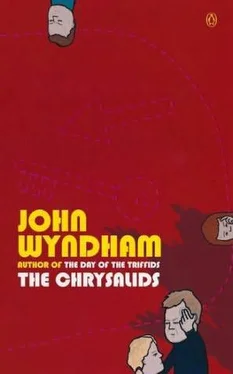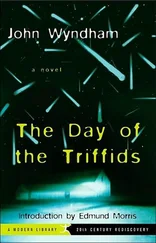It was as much a statement as a question, and she checked herself in the act of rising, to look at him inquiringly.
‘There is still Rachel,’ he explained.
The Sealand woman considered.
‘I’m not sure — Wait a minute,’ she told him.
She was suddenly in communication with someone on board the machine outside, at a speed and on a level where I could make almost nothing of it. Presently she shook her head regretfully.
‘I was afraid of that,’ she said. ‘I am sorry, but we cannot include her.’
‘It wouldn’t take long. It isn’t far — not for your flying machine,’ Michael insisted.
Again she shook her head.
‘I am sorry,’ she said again. ‘Of course we would if we could, but it is a technical matter. You see, the journey was longer than we expected. There were some dreadful parts that we dare not cross, even at great height: we had to go far round them. Also, because of what was happening here, we had to come faster than we had intended.’ She paused, seeming to wonder whether she were attempting an explanation beyond the understanding of such primitives as we. ‘The machine,’ she told us, ‘uses fuel. The more weight it has to carry, and the faster it travels, the more of this fuel it uses, and now we have only just enough of it left to get us back, if we go carefully. If we were to go to Waknuk and make another landing and take-off there, and try to carry four of you, as well as Petra, we should use up all our fuel before we could reach home. That would mean that we should fall into the sea, and drown. Three of you from here we can just manage with safety; four, and the extra landing, we can’t.’
There was a pause while we appreciated the situation. She had made it clear enough, and she sat back, a motionless figure in her gleaming white suit, her knees drawn up and her hands clasped round them, waiting sympathetically and patiently for us to accept the facts.
In the pause one became aware of the uncanniness of the silence all about us. There was not a sound to be heard now.
Not a movement. Even the leaves on the trees were unable to rustle. A sudden shock of realization jerked a question from Rosalind:
‘They’re not – they’re not all – dead ? I didn’t understand. I thought…’
‘Yes,’ the Sealand woman told her simply. ‘They’re all dead. The plastic threads contract as they dry. A man who struggles and entangles himself soon becomes unconscious. It is more merciful than your arrows and spears.’
Rosalind shivered. Perhaps I did, too. There was an unnerving quality about it — something quite different from the fatal issue of a man-to-man fight, or from the casualty roll of an ordinary battle. We were puzzled, too, by the Sealand woman, for there was no callousness in her mind, nor any great concern either: just a slight distaste, as if for an unavoidable, but unexceptional, necessity. She perceived our confusion, and shook her head reprovingly.
‘It is not pleasant to kill any creature,’ she agreed, ‘but to pretend that one can live without doing so is self-deception. There has to be meat in the dish, there have to be vegetables forbidden to flower, seeds forbidden to germinate; even the cycles of microbes must be sacrificed for us to continue our cycles. It is neither shameful nor shocking that it should be so: it is simply a part of the great revolving wheel of natural economy. And just as we have to keep ourselves alive in these ways, so, too, we have to preserve our species against other species that wish to destroy it — or else fail in our trust.
‘The unhappy Fringes people were condemned through no act of their own to a life of squalor and misery — there could be no future for them. As for those who condemned them — well, that, too, is the way of it. There have been lords of life before, you know. Did you ever hear of the great lizards? When the time came for them to be superseded they had to pass away.
‘Sometime there will come a day when we ourselves shall have to give place to a new thing. Very certainly we shall struggle against the inevitable just as these remnants of the Old People do. We shall try with all our strength to grind it back into the earth from which it is emerging, for treachery to one’s own species must always seem a crime. We shall force it to prove itself, and when it does, we shall go; as, by the same process, these are going.
‘In loyalty to their kind they cannot tolerate our rise; in loyalty to our kind, we cannot tolerate their obstruction.
‘If the process shocks you, it is because you have not been able to stand off and, knowing what you are, see what a difference in kind must mean. Your minds are confused by your ties and your upbringing: you are still half-thinking of them as the same kind as yourselves. That is why you are shocked. And that is why they have you at a disadvantage, for they are not confused. They are alert, corporately aware of danger to their species. They can see quite well that if it is to survive they have not only to preserve it from deterioration, but they must protect it from the even more serious threat of the superior variant.
‘For ours is a superior variant, and we are only just beginning. We are able to think-together and understand one another as they never could; we are beginning to understand how to assemble and apply the composite team-mind to a problem — and where may that not take us one day? We are not shut away into individual cages from which we can reach out only with inadequate words. Understanding one another, we do not need laws which treat living forms as though they were as indistinguishable as bricks; we could never commit the enormity of imagining that we could mint ourselves into equality and identity, like stamped coins; we do not mechanistically attempt to hammer ourselves into geometrical patterns of society, or policy; we are not dogmatists teaching God how He should have ordered the world.
‘The essential quality of life is living; the essential quality of living is change; change is evolution: and we are part of it.
‘The static, the enemy of change, is the enemy of life, and therefore our implacable enemy. If you still feel shocked, or doubtful, just consider some of the things that these people, who have taught you to think of them as your fellows, have done. I know little about your lives, but the pattern scarcely varies wherever a pocket of the older species is trying to preserve itself. And consider, too, what they intended to do to you, and why…’
As before, I found her rhetorical style somewhat overwhelming, but in general I was able to follow her line of thought. I did not have the power of detachment that could allow me to think of myself as another species - nor am I sure that I have it yet. In my thinking we were still no more than unhappy minor variants; but I could look back and consider why we had been forced to flee….
I glanced at Petra. She was sitting pretty much bored with all this apologia, watching the Sealand woman’s beautiful face with a kind of wistful wonder. A series of memories cut off what my eyes were seeing — my Aunt Harriet’s face in the water, her hair gently waving in the current; poor Anne, a limp figure hanging from a beam; Sally, wringing her hands in anguish for Katherine, and in terror for herself; Sophie, degraded to a savage, sliding in the dust, with an arrow in her neck….
Any of those might have been a picture of Petra’s future…. I shifted over beside her, and put an arm round her. During all the Sealand woman’s disquisition Michael had been gazing out of the entrance, running his eyes almost covetously over the machine that waited in the clearing. He went on studying it for a minute or two after she had stopped, then he sighed, and turned away. For a few moments he contemplated the rock floor between his feet. Presently he looked up.
Читать дальше












